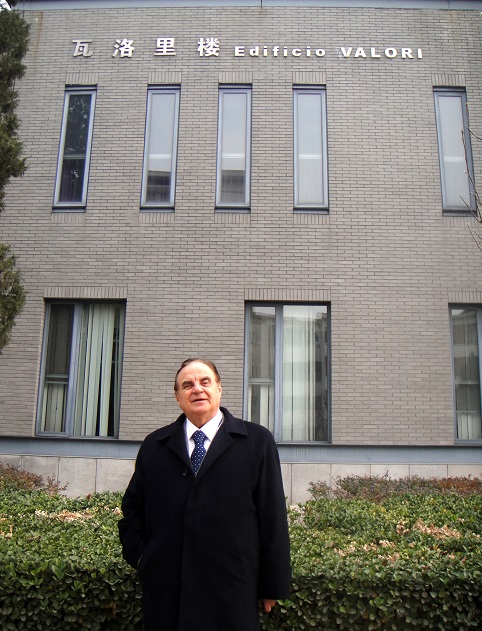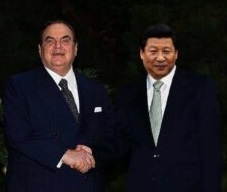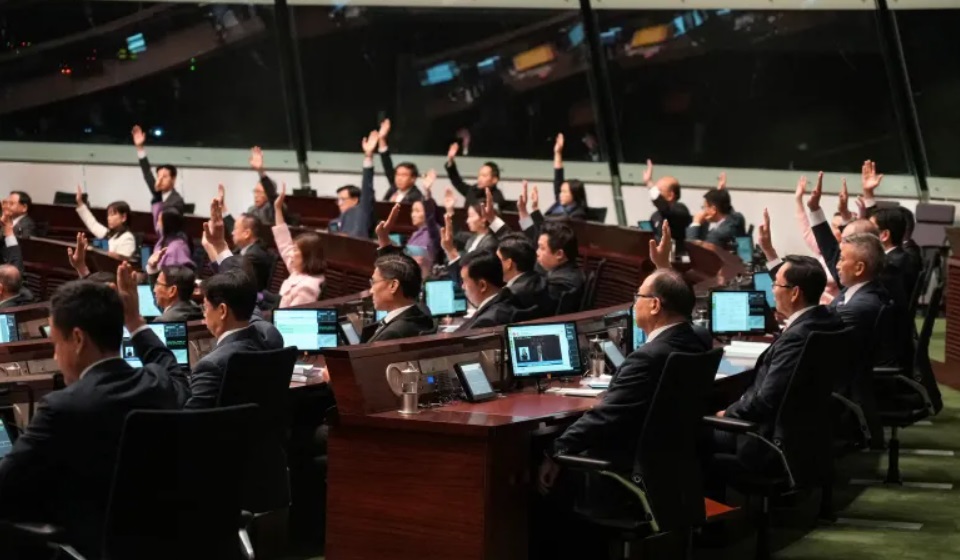By Giancarlo Elia Valori – Honorable de l’Académie des Sciences de l’Institut de France, Honorary Professor at the Peking University.
Recent events relating to the passage of a law by the Legislative Council (Parliament) of Xianggang (Hong Kong) are arousing outrage among many Westerners who probably believe that Xianggang is still a British colony or who, after learning that it was peacefully, albeit reluctantly, returned by London to Beijing twenty-seven years ago, would like the West to continue to dictate its rules in defiance of the Chinese people and the members of the Legislative Council themselves, who are expressions of the citizens of Xianggang.

Let’s take a step back and dive into history to tell how the Fragrant Incense Port ended up in the hands of the British Empire. It all began when Britain fought two Opium Wars (1839-42, 1856-60) in order to have not only the opportunity but also the right to export drugs to the Middle Kingdom: Britain’s first pusher, by force of arms, took it upon himself to sell opium to the Chinese, a drug refined and perfected by India, reduced to the status of an appendage of Queen Victoria.
Hong Kong was founded as a colony of the British Empire after the Qing Dynasty ceded Xianggang Island in 1841-1842, following the defeat in the First Opium War that humiliated the Middle Kingdom. The colony expanded to the Jiulong (Kowloon) Peninsula in 1860, and was further expanded when the United Kingdom obtained a 99-year lease of the New Territories in 1898.
Two years later, a multinational force consisting of Austria-Hungary, France, Germany, Japan, Italy, the United Kingdom, Russia, and the United States of America landed in China to suppress the anti-colonial-imperialism Boxer Rebellion. The uprising was followed by numerous abuses, summary killings and rapes of Chinese civilians, as well as the looting of art (much of which was taken to Europe).
As Allied troops moved from Beijing into the countryside of northern China, they executed an unknown number of people accused or suspected of being or resembling Boxer rebels. While the Allies were in Beijing, they looted palaces, yamen, and government buildings, causing incalculable losses of cultural relics, literature, and history books (including the famous Yongle Dadian) and damage to cultural heritage sites (including the Forbidden City, the Summer Palace, Xishan, and the Old Summer Palace).
More than three thousand gilded bronze Buddhas, 1,400 art objects and 4,300 bronzes from Songzhu Temple were looted. Allied troops scraped away the gilding from the copper cisterns in front of the Forbidden City buildings, leaving scratches still visible today. The Yongle Dadian, compiled by 2,100 scholars during the Ming Yongle period (1403-1408), with a total of 22,870 volumes, was partially destroyed during the Second Opium War in 1860. It was later collected in the Imperial Palace on Nanchizi Road. However, it was discovered and completely destroyed by the Alliance in 1900. Part of the Yongle Dadian was used to build fortifications.
The Complete Library of the Four Treasures (or Siku Quanshu) was compiled by 360 scholars during the Qing Qianlong period. It collected 3,461 ancient books with a total of 79,309 volumes. Some of them were destroyed in 1860 during the Second Opium War. Another ten thousand or more volumes were destroyed by the Eight Nation Alliance in 1900. The Hanlin Academy housed a collection of valuable books, Song Dynasty books, literary and historical materials, and valuable paintings. The Alliance of Eight Nations looted these collections as well. Some of these books, stolen from the Chinese people, are still kept in museums in London and Paris in disgrace, with no intellectual demand that they be returned to the Chinese people.
The alliance was dissolved after the signing of the Boxer Protocol in 1901 – after two years of fighting – an agreement that today falls under the heading of unequal treaties imposed by force.
And today, the “colorful” heirs of the same imperial-colonialists are reintroducing themselves with the words of freedom and democracy, hoping to be able to return to exploit Xianggang at their own will and convenience.
As for the new national security legislation in Xianggang, some people’s misunderstandings and controversies focus mainly on the following points: (1) the legislative process is too fast; (2) the new regulation is too strict and some provisions are too ambiguous, leaving ample room for explanation and thus giving more power to law enforcement; (3) the law violates human rights principles and may hinder foreign businesses and endanger foreigners living in Xianggang; and (4) the law further pushes Xianggang to lose its uniqueness and competitiveness in the world, making it a city with no difference from other cities in mainland China.
So let’s make it clear:
1) If there is agreement among members of the Legislative Council, it is not clear why it is too fast; it is laughable to say so, especially in Western countries such as Italy, where citizens complain about the excessive length of legal, procedural and bureaucratic processes.
2) It is not for third parties to judge the severity and merit of another country’s laws, but for its people to express themselves through representative institutions; and this is affirmed by international law; unless we intervene with humanitarian bombing and sophisticated weapons to change people’s minds; for that matter, yes, doing so would eliminate law enforcement in Xianggang altogether, as the aforementioned wanted.
3) The violation of human rights, the first of which is life, should be asked of the people of Dresden, Hiroshima, Nagasaki; of the peoples of Vietnam, Iraq, Afghanistan and those of Africa and other parts of the world treated as cannon fodder of the Western war industry.
4) Why should the Chinese not make it a city no different from any other city in mainland China? This legislation protects national security and is in line with international practice. All countries in the world attach great importance to national security legislation, which is linked to the survival of a state. Xianggang is a special administrative region of the People’s Republic of China, not any other, and has a constitutional responsibility to safeguard national security.
Through the legislation of Article 23 of the Basic Law, Xianggang can supplement local laws on national security, absorb new international regulations on national security crimes, and build a comprehensive legal system to safeguard national security. Only in this way, without external interference, can Xianggang gain confidence, develop its economy with peace of mind, and maintain long-term prosperity and stability.
National security is the cornerstone of Xianggang’s development, because there will be no conflict between national security and public interests. The reason is simple: there is no public interest in this world that can endanger national security. If it endangers national security, it cannot be in the public interest.
Article 23 of the Basic Law adds some crimes according to the needs of the current situation: it is forward-looking and should provide important support for maintaining good governance and long-term stability in Xianggang.
The Article 23 legislation builds a strong national security wall and closes some legal loopholes. In particular, the amendment of some existing laws, the conversion of some common law crimes into statutory laws, and the creation of extraterritorial effects will leave no room for anti-Chinese and disruptive elements to gain a foothold in Xianggang, and this is clearly how the city is protecting itself from heterodox color revolutions, whose failures are sowing death in Eastern Europe.
Article 23 of the Xianggang Basic Law is clear: “The Xianggang Special Administrative Region shall enact its own laws to prohibit any act of treason, secession, sedition, subversion of the Central People’s Government, and theft of state secrets, to prohibit political organizations or groups from conducting activities in the Xianggang Special Administrative Region, and to prohibit political organizations or groups in the Xianggang Special Administrative Region from establishing relations with foreign political organizations or groups. That is, to prevent foreign intervention that endangers national security and organizations that engage in activities that undermine national security.
The Xianggang government promoted the Article 23 legislation on January 30 and launched a month-long public consultation, receiving more than 13,000 opinions, of which 98.64 percent were supportive and positive. On this basis, the Xianggang government drafted the bill and submitted it to the Legislative Council for review.
The regulations contained in the new laws have studied and absorbed a large number of common law provisions and precedents, maintaining the consistency and synchronization of national security legislation with major common law countries and regions; its criminal framework and punishment system are scientifically reasonable, comparable and compatible with the national security law, and can be used as a reference for areas where common law is applicable. The new regulations have sufficient preparatory work, a good basis of public opinion and a high degree of social consensus, and are an important benchmark for high-quality legislation in the special administrative region.
It is generally recognized by all walks of life in Xianggang that only by completing the local legislation of Article 23 and further improving the institutional system of the Special Administrative Region to safeguard national security will it be possible to ensure Xianggang’s prosperity and stability and the long-term implementation of the “one country, two systems” principle.
The “one country, two systems” policy helps safeguard the legitimate rights and freedoms of Xianggang residents and other citizens in accordance with the law, and is conducive to maintaining the long-term prosperity and stability of the Xianggang Special Administrative Region.
The so-called “protective wall” of prosperity and stability will ensure high-quality development with a high level of security and broad prospects for governance, and Xianggang’s prosperity will be more favored.
The national security system and the rule of law will continue to provide a legal deterrent to external intervention forces and help strengthen Xianggang society’s confidence and identity in the rule of law; enhance investor confidence and consolidate Xianggang’s international recognition and global service functions as an international financial center, optimizing Xianggang’s free business environment and promotion mechanism in the world.

Giancarlo Elia Valori– Honorable de l’Académie des Sciences de l’Institut de France, Honorary Professor at the Peking University, President of the International World Group and Global Strategic Business, Consultant to the Chinese HNA Group and Honorary Chairman of Huawei Italy.
Giancarlo Elia Valori is one of the most appreciated Italian managers in the world, a prestigious academic with friendly relationships and solid collaborations with Heads of State, politicians, entrepreneurs, managers and academics at the highest international levels.
(The views expressed in this article belong to the author and do not necessarily reflect the views of World Geostrategic Insights).







